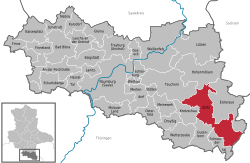Zeitz
Zeitz | |
|---|---|
 | |
 Coat of arms | |
show Location of Zeitz within Burgenlandkreis district | |
 Zeitz | |
| Coordinates: 51°2′52″N 12°8′18″E / 51.04778°N 12.13833°ECoordinates: 51°2′52″N 12°8′18″E / 51.04778°N 12.13833°E | |
| Country | Germany |
| State | Saxony-Anhalt |
| District | Burgenlandkreis |
| Government | |
| • Mayor (2016–23) | Christian Thieme[1] |
| Area | |
| • Total | 87.15 km2 (33.65 sq mi) |
| Elevation | 160 m (520 ft) |
| Population (2020-12-31)[2] | |
| • Total | 27,187 |
| • Density | 310/km2 (810/sq mi) |
| Time zone | UTC+01:00 (CET) |
| • Summer (DST) | UTC+02:00 (CEST) |
| Postal codes | 06711, 06712 |
| Dialling codes | 03441, 034423, 034426 |
| Vehicle registration | BLK, HHM, NEB, NMB, WSF, ZZ |
| Website | German: Stadt Zeitz |
Zeitz is a town in the Burgenlandkreis district, in Saxony-Anhalt, Germany. It is situated on the river White Elster, in the triangle of the federal states Saxony-Anhalt, Thuringia and Saxony.
History[]
Zeitz was first recorded under the name Cici in the synode of Ravenna in 967. Between 965 and 982, it was the chief fortress of the March of Zeitz. Zeitz was a bishop's residence between 968 and 1028, when it was moved to Naumburg. Beginning at the end of the 13th century, the bishops again resided in their castle at Zeitz. The Herrmannsschacht (built in 1889) is one of the oldest brick factories in the world. The city was captured by Swedish troops during the Thirty Years' War and was given to Electorate of Saxony in 1644. It was centre of Saxe-Zeitz between 1657 and 1718 before returning to Electorate (Became Kingdom of Saxony in 1806). In 1815, it was given to Kingdom of Prussia and became district (kreis) centre in Merseburg region (regierungsbezirk) of Province of Saxony till 1944, when it became part of Halle region. It became a county free city between 1901 and 1950. It was occupied by USA troops on 27 April 1945 and was given to Soviet ones on 1 July 1945. It was a district centre in Halle region of Saxony-Anhalt state between 1945 and 1952 and again 1990 and 1994 and in Halle bezirk between 1952 and 1990. It lost status centre of county and became part of Burgenlandkreis on 1 July 1994.
A bombing target of the Oil Campaign of World War II, the Brabag plant northeast of Zeitz used lignite coal to synthesize ersatz oil[3] – forced labor was provided by the nearby Wille subcamp of Buchenwald in Rehmsdorf and Gleina.[citation needed]. In the middle of the 1960s work started on the "Zeitz-Ost" residential area, and in the mid-1980s, housing estates such as the "Völkerfreundschaft" (English: International Friendship) were built.
On 18 August 1976, the Protestant clergyman Oskar Brüsewitz from burnt himself to death in front of the Michaeliskirche. This was a protest against the DDR system. The town was an industrial centre until German Reunification made many companies in eastern Germany uncompetitive, and 20,000 people lost jobs or moved to other employment. The town still has a large sugar factory, and the nearby lignite mines (Profen and Schleenhain) and Lippendorf Power Station, together employing 2,000 people from Zeitz.[4]
Main sights[]
Zeitz sights are predominantly situated along the Romanesque Road (point 52).
- Schloss Moritzburg, a baroque-style castle with the . The 10th century crypt displays 17th century tin coffins including that of Moritz, Duke of Saxony.[citation needed]
- Michaeliskirche (1154), originally a Romanesque basilica and contains a 1517 original of Martin Luther's 95 Theses.
- Town Hall (1509, rebuilt in 1909). It is a Gothic structure that, together with restored houses and 3 market-places, provides Zeitz' medieval appearance.
- Herrmannsschacht, a technical monument in a former brick factory.
Twin towns – sister cities[]
 Darkhan, Mongolia (1989)
Darkhan, Mongolia (1989) Detmold, Germany (1990)
Detmold, Germany (1990) Kaliningrad, Russia (1995)
Kaliningrad, Russia (1995) Tosu, Japan (1998)
Tosu, Japan (1998) Prescott, United States (2014)
Prescott, United States (2014)
Notable people[]
- Christian August of Saxe-Zeitz (1666–1725), Archbishop of Esztergom
- Anna Magdalena Bach (1701–1760), second wife of J. S. Bach
- Clemens Denhardt (1852–1929), Africa explorer
- Gustav Denhardt (1856–1917), African explorer
- Kurt Floericke (1869–1934), natural scientist, naturalist and author
- Ewald André Dupont (1891–1956), film director and screenwriter
- Heinrich Troeger (1901–1975), jurist and SPD politician
- Ewald Riebschläger (1904–1993), water jumper, European Champion
- Karl Walther (1905–1981), painter
- Gotthard Handrick (1908–1978), fighter pilot and athlete, Olympic champion
- Fritz Gödicke (1919–2009), football coach
- Horst Wende (1919–1996), bandleader, arranger and composer
- Heinz-Günther Lehmann (1923–2006), swimmer, European champion
- Manfred Kaiser (1929–2017), footballer and coach
- Rudolf Drößler (born 1934), author and science journalist
- Bernd Bauchspiess (born 1939), footballer
- Hans Zierold (born 1938), swimmer
- Klaus Trummer (born 1945), canoeist
- Jürgen Kretschmer (born 1947), canoeist
- Martina Falke (born 1951), canoeist
See also[]
References[]
- ^ Bürgermeisterwahlen in den Gemeinden, Endgültige Ergebnisse, Statistisches Landesamt Sachsen-Anhalt, accessed 8 July 2021.
- ^ "Bevölkerung der Gemeinden – Stand: 31. Dezember 2020" (PDF). Statistisches Landesamt Sachsen-Anhalt (in German). June 2021.
- ^ Becker, Peter W. (1981). "The Role of Synthetic Fuel In World War II Germany: implications for today?". Air University Review. Maxwell AFB.
- ^ Wecker, Katharina (1 June 2018). "Germany's mining communities brace themselves for post-coal era | DW | 01.06.2018". DW.COM. Archived from the original on 19 June 2018.
Permalink https://p.dw.com/p/2ym4b
- ^ "Partnerstädte". zeitz.de (in German). Zeitz. Retrieved 18 February 2021.
External links[]
| Wikimedia Commons has media related to Zeitz. |
- . Encyclopædia Britannica (11th ed.). 1911.
- Towns in Saxony-Anhalt
- Burgenlandkreis
- Province of Saxony
- Bezirk Halle
- Oil campaign of World War II



